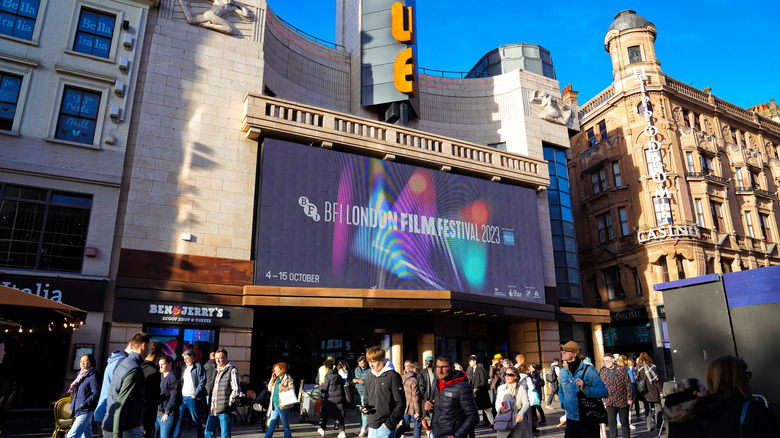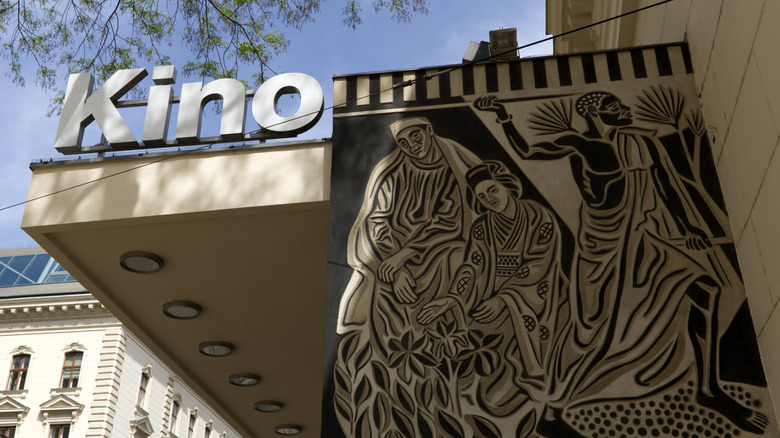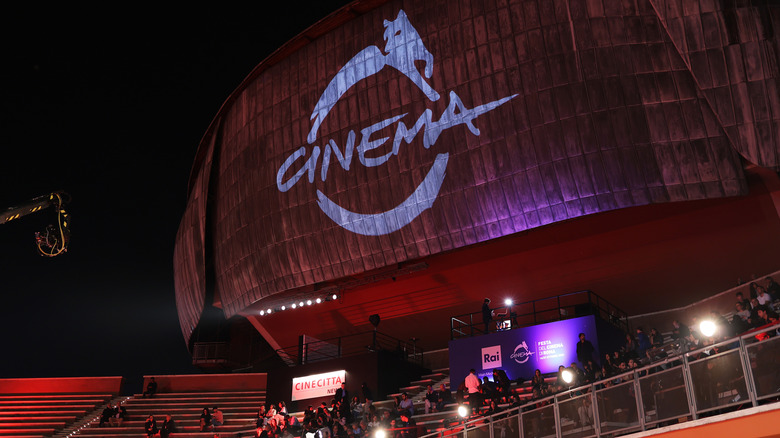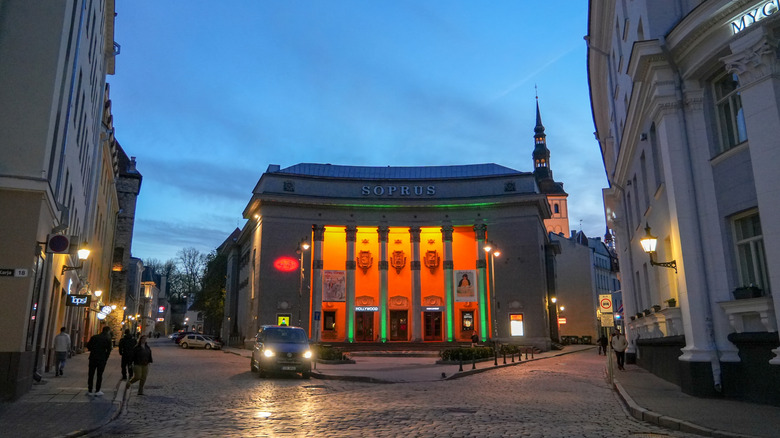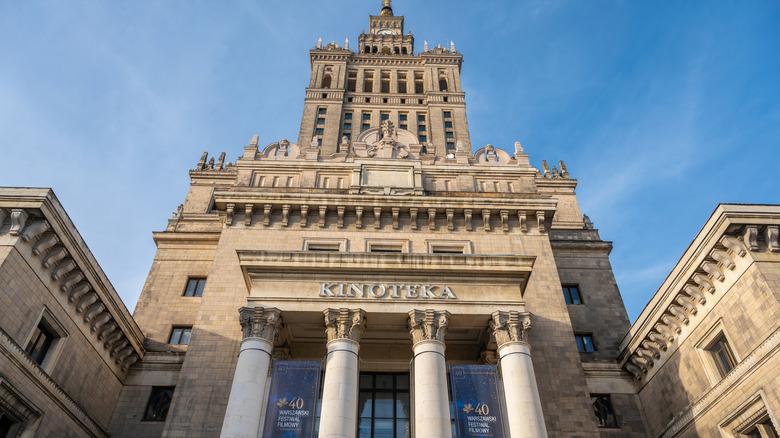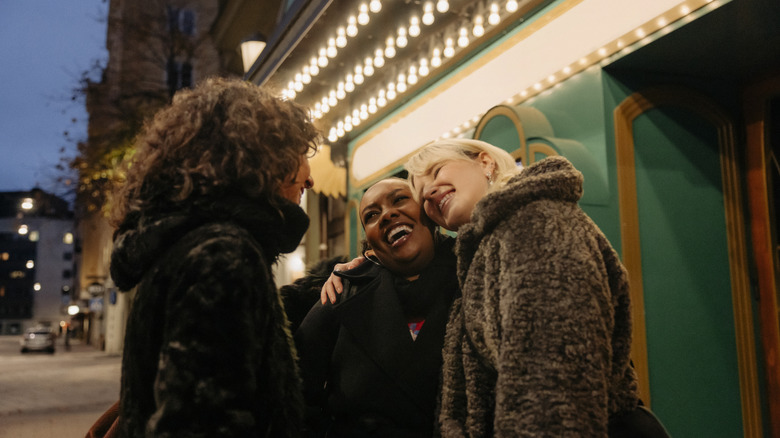Fall In Love With Cinema At Europe's Must-See Autumn Film Festivals
You've probably seen celebrity spreads of A-listers gliding down the red carpet at Cannes or the Venice Film Festival and assumed Europe's film festivals are off-limits to anyone outside the industry. While those top-tier fests do include some public events, cinephiles looking to visit Europe are better served by festivals that place audiences at the heart of the experience. Fall is the perfect season to dive in and experience some of the best international movie theaters worth traveling for. You might even hop between countries to catch more than one festival.
Want to get more involved? Both the BFI London Film Festival and Tallinn Black Nights Film Festival accept volunteer applications through their websites, and Tallinn also offers internships for students. For travelers, it's a way to peek behind the curtain, connect with locals, and even save a little on tickets. The five festivals we've highlighted all run between October and November, with affordable tickets that can be purchased online. Whether your idea of fun is spotting a favorite actor at a premiere or debating a provocative indie film with locals afterward, there's a film festival in Europe to fit the bill.
BFI London Film Festival
The United Kingdom may already be one of the ultimate destinations for movie and TV buffs thanks to its many famous filming locations, but the British Film Institute (BFI) London Film Festival adds another compelling reason to visit. The festival strikes a rare balance between red-carpet glamor and everyday accessibility. Held each October over 12 days, it offers a colorful program of premieres, screenings, and talks, with tickets going on sale about three weeks before opening night. Prices are refreshingly down-to-earth for such a high-profile event: Standard tickets start around $14, with a discounted price of $8 for those under 25. Even if you miss the initial sale, last-minute tickets are almost always released online at 10 a.m. each day, making it easy to catch a film on short notice.
Premieres — where A-list actors, directors, and Oscar contenders step onto the carpet — feel surprisingly open. Seats start at $22, and there's no pressure to dress up. Every feature and series at the festival is a U.K. first, and often still unavailable in cinemas or on streaming platforms, giving audiences the thrill of genuine discovery.
The programming itself is impressively broad, spanning films from across the globe, works in dozens of languages, and a strong showcase of female and non-binary filmmakers. Unlike a typical night at the movies, the director sometimes introduces the film, and select "Screen Talks" provide deeper access through Q&A sessions with leading filmmakers. The festival also embraces innovation, with a virtual reality lounge ($11) that plunges visitors into experimental animation and CGI worlds. Whether you splurge on a premiere or grab a last-minute bargain ticket, the London Film Festival makes one of the film world's most prestigious gatherings feel refreshingly welcoming.
Viennale Film Festival
The Viennale is Vienna's largest annual film festival, running for about two weeks each October and filling the city with a buzz of cinephile energy. The program spans feature films, documentaries, and shorts in dozens of languages, with a mix of English and German subtitles — so English speakers should check carefully before booking. Tickets cost $12 and go on sale online a few days before the festival begins, though many locals skip the early scramble. Instead, it's common to simply show up at the cinema half an hour before showtime and line up for a last-minute ticket. You might not sit with your friends, but that's part of the festival spirit: The line has its own lively energy, and the spontaneity makes it easy to discover films you might otherwise overlook.
What sets the Viennale apart are the historic film houses where screenings take place. In true Vienna fashion, the Metro Kino Kulturhaus has an atmosphere steeped in 1920s elegance: Red velvet seats, wooden paneling, and opulent gold furnishings make it feel more like a theater palace than a movie house. The venue doubles as an exhibition space and café-bar, perfect for lingering discussions after the credits roll. Gartenbaukino offers the opposite kind of thrill: A single sweeping auditorium with nearly 800 plush seats and a massive screen, designed with mid-century modern flair. It's here that Europe's most elegant city stages its glamorous premieres and gala nights, where the excitement of the crowd makes every screening feel like an event in itself.
International Rome Film Festival
While the Venice Film Festival remains the top A-List affair, count the International Rome Film Festival among the underrated attractions in Rome you'll want to add to your bucket list. Held over 11 days each October, (and not to be confused with a festival bearing nearly the same name in Rome, Georgia) the festival's heart is the Auditorium Parco della Musica. This striking red-brick complex features sweeping forms that were designed as a modern homage to some of Rome's famous landmarks, including the Parthenon. Screenings also extend into other corners of the city, including the Teatro Palladium and, in recent years, even Leonardo da Vinci Airport — turning an unexpected layover into a bonus cinema experience. The Parco della Musica also rolls out one of the world's longest red carpets for the festival, giving all attendees the chance to feel like movie stars.
Unlike Venice, which leans heavily into the film industry, the Rome International Film Festival is built with audiences in mind. Its program includes films competing for Rome's major awards, but just as much attention is given to categories outside the competition. These range from a curated lineup of the year's standout international films to screenings devoted to cinema history and tributes to leaders in both Italian and international film. The result is a mix that balances eagerly awaited premieres with thoughtful retrospectives, making it easy to stumble onto both big-name directors and hidden gems. Tickets typically go on sale online about a week before the opening night, with pricing ranging from $5.50 to $28. Movie fans looking for a festival experience that feels both glamorous and accessible will find that Rome offers one of Europe's most welcoming stages.
Tallinn Black Nights Film Festival
Tallinn's Black Nights Festival is one of Northern Europe's largest film events, and this underrated European capital city provides the perfect stage. Held each November over two weeks, it coincides with long, 16-hour nights, making it easy to settle into the festival rhythm of nightly screenings at the grand columned Soprus theater or other historic cinemas. The program is impressively global, with more than 500 films — including shorts — from over 80 countries. Despite its scale, the festival maintains an unpretentious atmosphere: Film lovers often note the absence of red-carpet fuss and the emphasis instead on cinema itself, which is exactly what draws many visitors who simply want to watch great films.
One of the festival's best features is its organization. While some European festivals are notorious for clunky websites, Tallinn's digital platform is clean, intuitive, and even allows visitors to create a personalized screening schedule. Tickets are straightforward, too: Single screenings are priced at about $13, with package deals for those planning to see several films. A 12-ticket pass runs $106, while a 10-ticket pass for children costs around $71, making it one of the more affordable major festivals on the continent. For travelers curious about a serious yet welcoming cinema event — and a chance to see Estonia at its most atmospheric — Tallinn's Black Nights Festival is hard to top.
Warsaw International Film Festival
The Warsaw International Film Festival also has a professional, organized website, perfect for foreign cinephiles looking to buy tickets. The festival prides itself as an experimental space perfect for young talents to make a splash in the world of cinema, and has hosted a slew of films by directors who have gone on to win major awards. Its International Short Films Competition is one of the rare qualifiers worldwide for Oscar nominations, giving short-form storytellers a coveted spotlight. Reflecting Warsaw's position between East and West — and the political turbulence in neighboring regions — the festival also highlights films that challenge authority and spark conversation, adding a sharp, contemporary edge to its programming.
Held each October, screenings unfold across some of Warsaw's most striking venues. The Soviet-style Palace of Culture and Science houses the Kinoteka, a cinema that boasts a marble-clad ticket hall and a rich red interior that feels grand and ceremonial. The newly built Varso Tower offers a more modern thrill with its "cinema in the clouds" on the 46th floor, pairing film screenings with panoramic city views from the EU's highest observation deck. Tickets go on sale several weeks before the festival begins and are priced accessibly at about $7 per screening — or just $4 during family weekend — making Warsaw one of the best-value major film festivals in Europe.
Methodology and getting involved
We considered more than a dozen film festivals across Europe before narrowing this list to those that are most welcoming to international visitors and set in particularly atmospheric venues. Preference went to festivals with easy-to-navigate English-language websites, straightforward online ticketing, and plenty of films screened with English subtitles. We also highlighted events that bring something unique to the experience — whether that's volunteer opportunities, distinctive competition categories, or venues that make simply walking into the theater feel special.

